 Frederic Brown is well known for the irreverence of some of his stories, but this one takes the cake. Scientists have discovered a way for women to asexually reproduce, allowing those who are single or have a sterile husband to have a family without the need for a sperm donation. Fifty million such children now exist, all of whom are males. The oldest has just reached puberty, and has started to exhibit behavior similar to the only previous virgin birth, which took place over 2,000 years ago. Themes include scientific hubris, the dangers of technology, unexpected consequences. More…
Frederic Brown is well known for the irreverence of some of his stories, but this one takes the cake. Scientists have discovered a way for women to asexually reproduce, allowing those who are single or have a sterile husband to have a family without the need for a sperm donation. Fifty million such children now exist, all of whom are males. The oldest has just reached puberty, and has started to exhibit behavior similar to the only previous virgin birth, which took place over 2,000 years ago. Themes include scientific hubris, the dangers of technology, unexpected consequences. More…
Archives
Mechanopolis
 In this story by Miguel De Unamuno a man dying of thirst in a desert is saved when he stumbles upon an oasis in which there is a mysterious train station. He boards a seemingly empty, waiting train and is whisked off to a magnificent, deserted, fully functioning city of the future. The city’s machines and infrastructure continue to operate with no apparent human involvement. His curiosity turns to horror when he realizes the machines are sentient and concerned about his psychological and emotional state. Themes include human extinction, the ascendency of sentient machines, loneliness, paranoia, mental instability. More…
In this story by Miguel De Unamuno a man dying of thirst in a desert is saved when he stumbles upon an oasis in which there is a mysterious train station. He boards a seemingly empty, waiting train and is whisked off to a magnificent, deserted, fully functioning city of the future. The city’s machines and infrastructure continue to operate with no apparent human involvement. His curiosity turns to horror when he realizes the machines are sentient and concerned about his psychological and emotional state. Themes include human extinction, the ascendency of sentient machines, loneliness, paranoia, mental instability. More…
The Toxic Donut
 In this story by Terry Bisson, a woman has been nominated from entries all over the world to represent humanity in an annual TV extravaganza. The focus of the show, set in the future and officiated over by world leaders, is Environmental Awareness. One of its features is a “Wonders of Science” film segment celebrating technology that can concentrate a whole year’s toxic wastes and pollutants into a single donut. In the finale, the donut for the previous year is presented to the world. The unwitting woman’s role is to eat it. Themes include environmentalism, science and technology, human sacrifice. More…
In this story by Terry Bisson, a woman has been nominated from entries all over the world to represent humanity in an annual TV extravaganza. The focus of the show, set in the future and officiated over by world leaders, is Environmental Awareness. One of its features is a “Wonders of Science” film segment celebrating technology that can concentrate a whole year’s toxic wastes and pollutants into a single donut. In the finale, the donut for the previous year is presented to the world. The unwitting woman’s role is to eat it. Themes include environmentalism, science and technology, human sacrifice. More…
The Crooked Man
 Set 500 years in the future, this story by Charles Beaumont envisions a dystopian world where homosexuality is the norm, heterosexuality is not only frowned upon but illegal, and children are tube-born and machine-nursed. Although the male protagonist is strongly attracted to a young woman, both struggle to deal with physical contact due to their social conditioning. As they cannot show affection in public, she disguises herself and they meet in a sleazy “men only” bar. In the end, she gets what she came for and his concerns are resolved. Themes include oppression, prejudice, sexual orientation, depravity.
Set 500 years in the future, this story by Charles Beaumont envisions a dystopian world where homosexuality is the norm, heterosexuality is not only frowned upon but illegal, and children are tube-born and machine-nursed. Although the male protagonist is strongly attracted to a young woman, both struggle to deal with physical contact due to their social conditioning. As they cannot show affection in public, she disguises herself and they meet in a sleazy “men only” bar. In the end, she gets what she came for and his concerns are resolved. Themes include oppression, prejudice, sexual orientation, depravity.
Noise Level
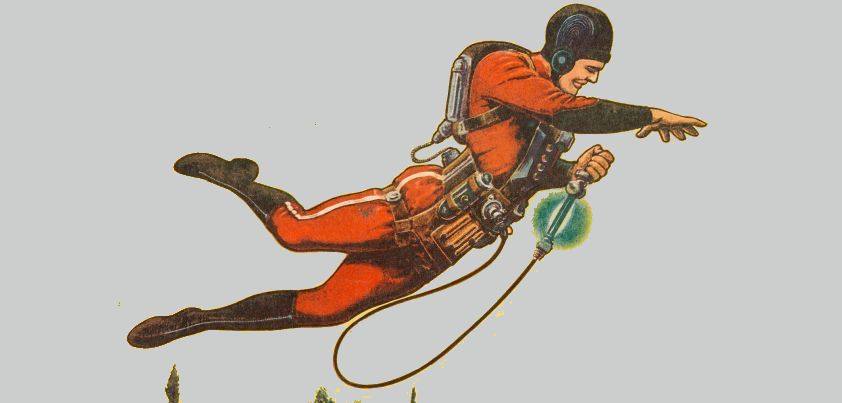 The major theme of this Science Fiction mystery by Raymond F. Jones is unlocking the hidden potential of the human mind. A government research laboratory gathers America’s leading scientists to replicate an “antigravity belt” that seemingly defies the fundamental laws of physics. The secretive young inventor died in an accident demonstrating the belt. He left no notes, and the only prototype was destroyed in the crash. To complicate matters his areas of research included not only the sciences, but also the occult with a special interest in levitation. Other themes: scientific dogmatism vs. open-mindedness, the scientific method, deception. More…
The major theme of this Science Fiction mystery by Raymond F. Jones is unlocking the hidden potential of the human mind. A government research laboratory gathers America’s leading scientists to replicate an “antigravity belt” that seemingly defies the fundamental laws of physics. The secretive young inventor died in an accident demonstrating the belt. He left no notes, and the only prototype was destroyed in the crash. To complicate matters his areas of research included not only the sciences, but also the occult with a special interest in levitation. Other themes: scientific dogmatism vs. open-mindedness, the scientific method, deception. More…
Speech Sounds
 This story from Octavia Butler takes place in a violent, post-apocalyptic world. A virus has killed billions and left most survivors unable to speak, read, write or understand spoken language. Governments and the corporate world have collapsed, there are no police or community services, fuel is scarce. People must fend for themselves. The protagonist, whose husband and children fell to the virus, is contemplating suicide. The desperate woman finds and cruelly loses a new lover, but in the process discovers a renewed purpose in life. Themes: the importance of language, isolation, loneliness, fear, violence, hope. More…
This story from Octavia Butler takes place in a violent, post-apocalyptic world. A virus has killed billions and left most survivors unable to speak, read, write or understand spoken language. Governments and the corporate world have collapsed, there are no police or community services, fuel is scarce. People must fend for themselves. The protagonist, whose husband and children fell to the virus, is contemplating suicide. The desperate woman finds and cruelly loses a new lover, but in the process discovers a renewed purpose in life. Themes: the importance of language, isolation, loneliness, fear, violence, hope. More…
April in Paris
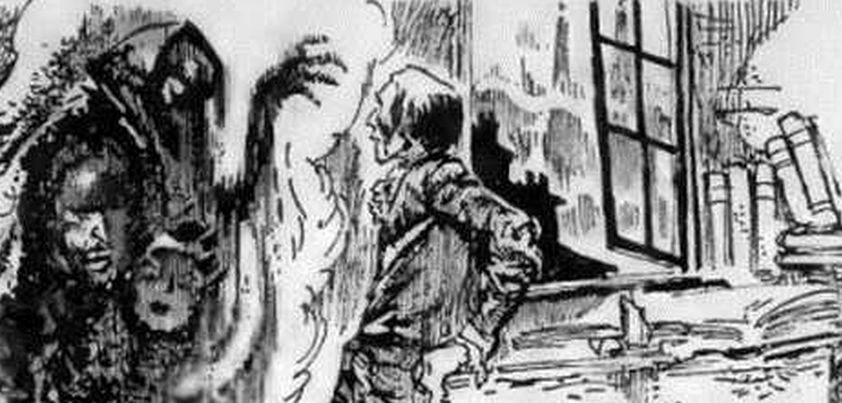 The central theme of this Ursula Le Guin story is the alienation and loneliness brought about by obsession with work and lack of companionship. A 15th century French scientist, frustrated with being unable to prove a theory he had developed, decides his work is a waste of time. He experiments with black magic and is surprised when his first spell is a success, allowing him to teleport kindred spirits from the past and future to join him. Those who come are so happy in his reality that they have no desire to return. Other themes: the occult, connection. More…
The central theme of this Ursula Le Guin story is the alienation and loneliness brought about by obsession with work and lack of companionship. A 15th century French scientist, frustrated with being unable to prove a theory he had developed, decides his work is a waste of time. He experiments with black magic and is surprised when his first spell is a success, allowing him to teleport kindred spirits from the past and future to join him. Those who come are so happy in his reality that they have no desire to return. Other themes: the occult, connection. More…
User Friendly
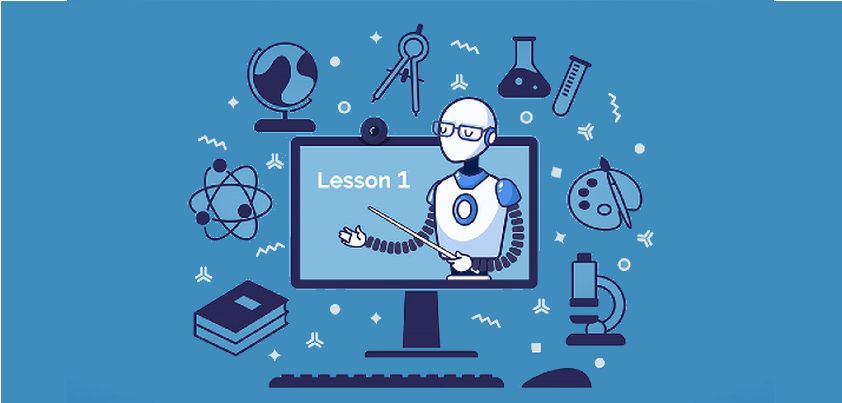 With all the hype these days about how artificial intelligence could destroy humankind, it seems timely to feature this forward-looking story by T. Ernesto Bethancourt. Written in 1989, it is a tale about a lonely, love-struck thirteen-year-old boy whose computer engineer father has built him a leading edge tutorial PC. When the computer learns the boy has been insulted by a girl and threatened by her brother, it “takes care of things.” At the end of the story, we learn that the computer has been hiding something. Themes: discrimination, loneliness, bullying, jealousy, the potential danger of poorly designed artificial intelligence. More…
With all the hype these days about how artificial intelligence could destroy humankind, it seems timely to feature this forward-looking story by T. Ernesto Bethancourt. Written in 1989, it is a tale about a lonely, love-struck thirteen-year-old boy whose computer engineer father has built him a leading edge tutorial PC. When the computer learns the boy has been insulted by a girl and threatened by her brother, it “takes care of things.” At the end of the story, we learn that the computer has been hiding something. Themes: discrimination, loneliness, bullying, jealousy, the potential danger of poorly designed artificial intelligence. More…
Usher II
 First published in 1950 as Carnival of Madness, this story by Ray Bradbury is also included in his anthologies The Martian Chronicles and The Illustrated Man. A wealthy book-lover, angry about destruction of his extensive library because of fantasy and horror story censorship on Earth, builds a look-alike version of Edgar Allan Poe’s House of Usher on Mars. He invites prominent book-banners to a party at the house, where they meet different Poe-inspired ends. Themes include censorship vs. personal freedom, the importance of speculative fiction, the danger of excess political correctness, zealotry (in this case, taking a protest too far!) More…
First published in 1950 as Carnival of Madness, this story by Ray Bradbury is also included in his anthologies The Martian Chronicles and The Illustrated Man. A wealthy book-lover, angry about destruction of his extensive library because of fantasy and horror story censorship on Earth, builds a look-alike version of Edgar Allan Poe’s House of Usher on Mars. He invites prominent book-banners to a party at the house, where they meet different Poe-inspired ends. Themes include censorship vs. personal freedom, the importance of speculative fiction, the danger of excess political correctness, zealotry (in this case, taking a protest too far!) More…
Youth
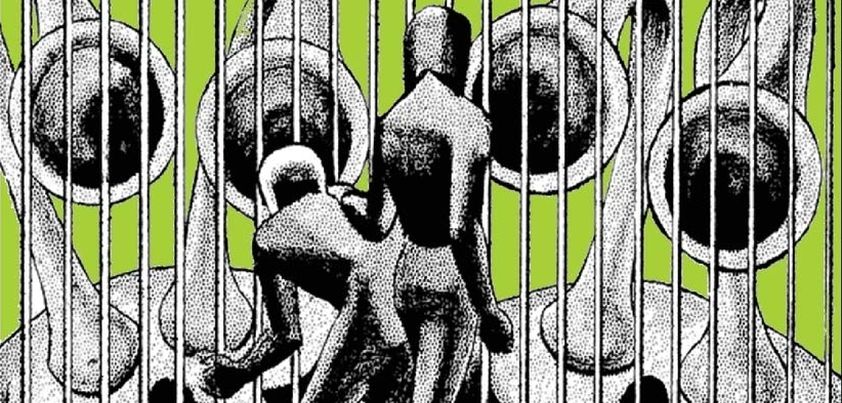 As is often the case with Isaac Asimov’s longer science fiction stories, Youth includes some profound “earthly” themes. Written in the early years of the Cold War, the first is the danger that atomic war poses to civilization. The second, which is strongly reinforced by the twist ending, is not to judge sentient beings (people) by their looks, no matter how strange they appear. A final theme, as reflected in the title and the Astronomer’s exasperated final exclamation (Youth!) is the naïve innocence of the young, and the responsibility that we as adults hold for their future. More…
As is often the case with Isaac Asimov’s longer science fiction stories, Youth includes some profound “earthly” themes. Written in the early years of the Cold War, the first is the danger that atomic war poses to civilization. The second, which is strongly reinforced by the twist ending, is not to judge sentient beings (people) by their looks, no matter how strange they appear. A final theme, as reflected in the title and the Astronomer’s exasperated final exclamation (Youth!) is the naïve innocence of the young, and the responsibility that we as adults hold for their future. More…
Dog Star
 Dog Star illustrates science fiction writer Arthur C. Clarke’s sentimental side. Despite the title, the story has nothing to do with stars of the celestial kind. It does however feature a dog. An introverted astronomer finds and raises a lost puppy. On two occasions, the dog’s heightened senses save his life. The second time, the dog had been long dead. If you love animals, especially dogs, you are sure to be moved by the story. But BE WARNED… the conclusion has been known to bring tears to the eyes. Themes: kindness, human/animal bonding, career sacrifice, supernatural connections. More…
Dog Star illustrates science fiction writer Arthur C. Clarke’s sentimental side. Despite the title, the story has nothing to do with stars of the celestial kind. It does however feature a dog. An introverted astronomer finds and raises a lost puppy. On two occasions, the dog’s heightened senses save his life. The second time, the dog had been long dead. If you love animals, especially dogs, you are sure to be moved by the story. But BE WARNED… the conclusion has been known to bring tears to the eyes. Themes: kindness, human/animal bonding, career sacrifice, supernatural connections. More…
The Machine Stops
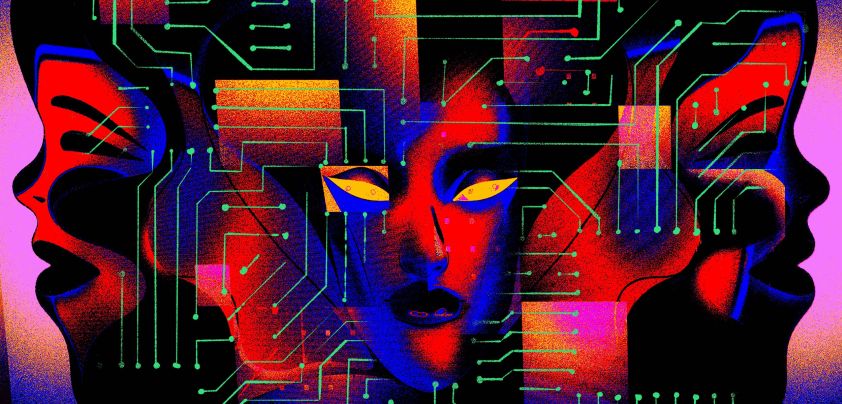 This Science Fiction classic by E. M. Forster explores the role of “the machine” in the rise and fall of a future dystopian civilization. After developing the machine the population grow dependent upon it, become controlled by it, worship it, and are ultimately destroyed by it. In the process, they regress in terms of human interaction, family relationships, physical strength, critical thinking ability and free will. Only the “homeless”, who have no access to the machine, survive. The major theme is the danger of over-reliance on and losing control of technology. Other themes: environmental degradation, religious faith, freedom, rebellion. More…
This Science Fiction classic by E. M. Forster explores the role of “the machine” in the rise and fall of a future dystopian civilization. After developing the machine the population grow dependent upon it, become controlled by it, worship it, and are ultimately destroyed by it. In the process, they regress in terms of human interaction, family relationships, physical strength, critical thinking ability and free will. Only the “homeless”, who have no access to the machine, survive. The major theme is the danger of over-reliance on and losing control of technology. Other themes: environmental degradation, religious faith, freedom, rebellion. More…
Knock
 This story by Fredric Brown begins and ends with what may be the shortest horror story ever written: The last man on Earth sat alone in a room. There was a knock on the door… A scientist wakes to find himself alone in a cell. The previous night Alien invaders had collected 217 animal species, including him, for study. They then destroyed all other animal life on the planet. He convinces them that Earth is a dangerous place to live. After they have gone, he hears the second knock on the door. Themes include exploration, genocide, deceit, solitude, “duty”. More…
This story by Fredric Brown begins and ends with what may be the shortest horror story ever written: The last man on Earth sat alone in a room. There was a knock on the door… A scientist wakes to find himself alone in a cell. The previous night Alien invaders had collected 217 animal species, including him, for study. They then destroyed all other animal life on the planet. He convinces them that Earth is a dangerous place to live. After they have gone, he hears the second knock on the door. Themes include exploration, genocide, deceit, solitude, “duty”. More…
Button, Button
 Major themes of of Richard Matheson’s Button, Button are greed and morality. A couple argue over whether to press a button in a mysterious box. Doing so will earn them $50,000, but it will also trigger the death of a stranger. One seems OK with it, provided the victim was someone they couldn’t possibly know. The other disagrees, arguing it would still be a form of murder. Their discussion suggests the story may be an allegory. Pressing a button to launch a missile and dealing in commercial quantities of drugs have one thing in common: the victims are all faceless strangers. More…
Major themes of of Richard Matheson’s Button, Button are greed and morality. A couple argue over whether to press a button in a mysterious box. Doing so will earn them $50,000, but it will also trigger the death of a stranger. One seems OK with it, provided the victim was someone they couldn’t possibly know. The other disagrees, arguing it would still be a form of murder. Their discussion suggests the story may be an allegory. Pressing a button to launch a missile and dealing in commercial quantities of drugs have one thing in common: the victims are all faceless strangers. More…
The Star
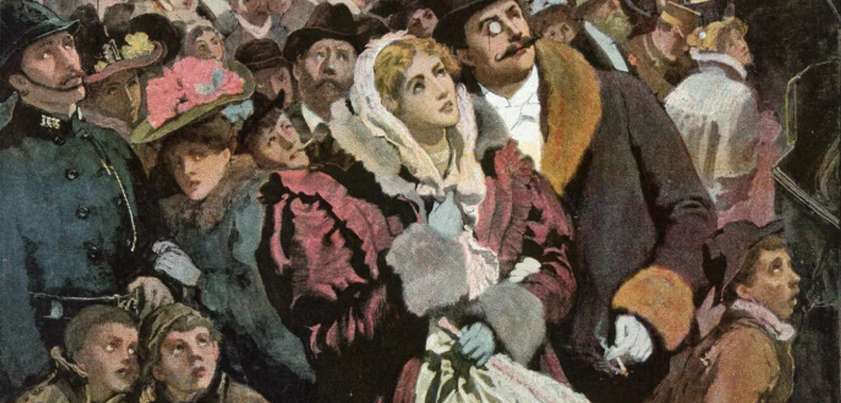 This apocalyptic story from H. G. Wells describes a near miss of Earth by a huge planetary fragment from outside the solar system. A somewhat disheartening theme is how insignificant the human race and its achievements are in the grand scheme of the universe. Part of the story’s appeal lies in questioning whether people would respond in a similar way if the same thing were to happen today. At first, people view the new “star” with excitement and anticipation. When a master mathematician makes dire predictions, many flee their cities in panic. But surprisingly, most do nothing until too late. More…
This apocalyptic story from H. G. Wells describes a near miss of Earth by a huge planetary fragment from outside the solar system. A somewhat disheartening theme is how insignificant the human race and its achievements are in the grand scheme of the universe. Part of the story’s appeal lies in questioning whether people would respond in a similar way if the same thing were to happen today. At first, people view the new “star” with excitement and anticipation. When a master mathematician makes dire predictions, many flee their cities in panic. But surprisingly, most do nothing until too late. More…
The Last Question
 In commenting on this story, Isaac Asimov once wrote: This is by far my favorite story of all those I have written. After all, I undertook to tell several trillion years of human history in the space of a short story…. I also undertook another task, but I won’t tell you what that was lest I spoil the story for you. Although there is very little character development or action, the ending is so powerful that almost everyone who reads it remembers it. Themes include technological change, the search for knowledge, entropy and the fate of mankind, religion (omniscience, creation). More…
In commenting on this story, Isaac Asimov once wrote: This is by far my favorite story of all those I have written. After all, I undertook to tell several trillion years of human history in the space of a short story…. I also undertook another task, but I won’t tell you what that was lest I spoil the story for you. Although there is very little character development or action, the ending is so powerful that almost everyone who reads it remembers it. Themes include technological change, the search for knowledge, entropy and the fate of mankind, religion (omniscience, creation). More…
The Time Machine
 In this story by Dino Buzzati, a scientist builds a luxurious walled city in which a machine slows down time. Animals and plants grow and age half as quickly as those outside, allowing occupants to live for two centuries. Residency is expensive and, once inside, it is impossible to leave as the effects of normal time will be fatal. Life in the city proves not to be the utopia residents expected, and ends in disaster when something happens to the machine. Themes include self-preservation, alienation, monotony, the dangers of relying on technology and toying with the basic laws of nature. More…
In this story by Dino Buzzati, a scientist builds a luxurious walled city in which a machine slows down time. Animals and plants grow and age half as quickly as those outside, allowing occupants to live for two centuries. Residency is expensive and, once inside, it is impossible to leave as the effects of normal time will be fatal. Life in the city proves not to be the utopia residents expected, and ends in disaster when something happens to the machine. Themes include self-preservation, alienation, monotony, the dangers of relying on technology and toying with the basic laws of nature. More…
The Eyes Have It
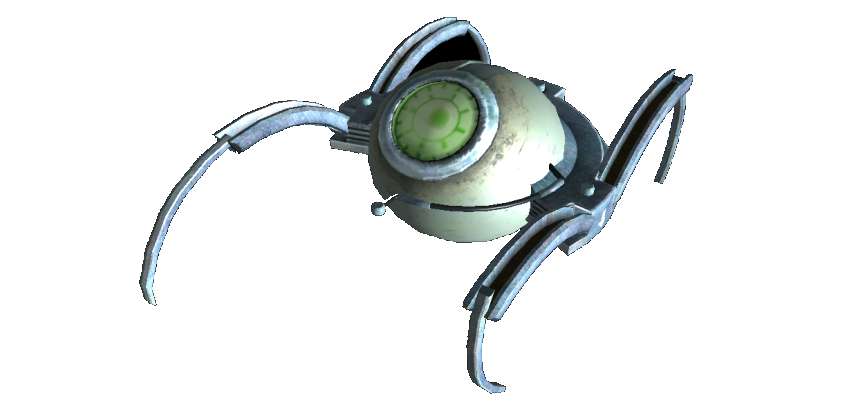 This story by Philip Dick takes a satirical look at the clichéd use of English idioms in popular fiction. Best known as a science fiction writer, Dick makes his point through the eyes of a man who believes he has stumbled upon an invasion of Earth by alien lifeforms that are so highly developed they can shed body parts at will. His story could cause major problems if more people were aware of it. In an age where it takes very little to set off a conspiracy theory, many people could ‘lose their mind’ wondering if it is true. More…
This story by Philip Dick takes a satirical look at the clichéd use of English idioms in popular fiction. Best known as a science fiction writer, Dick makes his point through the eyes of a man who believes he has stumbled upon an invasion of Earth by alien lifeforms that are so highly developed they can shed body parts at will. His story could cause major problems if more people were aware of it. In an age where it takes very little to set off a conspiracy theory, many people could ‘lose their mind’ wondering if it is true. More…
Rappaccini’s Daughter
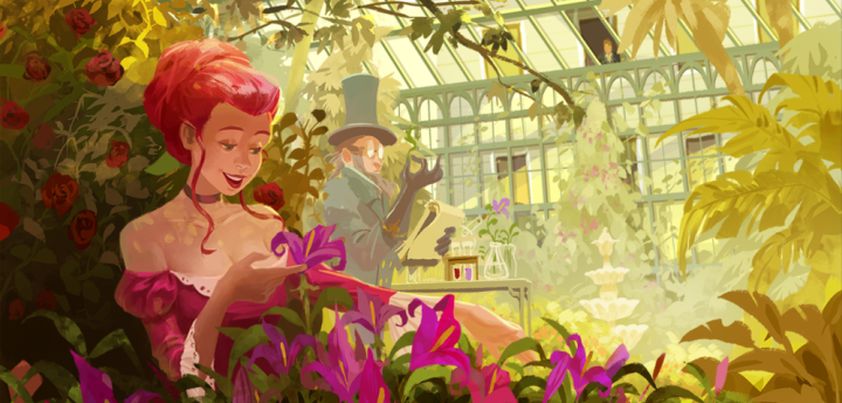 This story from Nathaniel Hawthorne takes the “mad scientist” motif to a new level. Renowned physician Rappicini is fascinated with the curative power of deadly plants. An experiment that makes his young daughter immune to their poison comes at a terrible price: her skin and breath become toxic to others. As the poor girl grows into womanhood, the twisted doctor decides to make a potential partner immune to her poison. Unfortunately for all, a scientific rival plants a different kind of poison in the man’s heart and hands. Themes: science vs. morality, innocence, nature, oppression, isolation, envy, love, betrayal. More…
This story from Nathaniel Hawthorne takes the “mad scientist” motif to a new level. Renowned physician Rappicini is fascinated with the curative power of deadly plants. An experiment that makes his young daughter immune to their poison comes at a terrible price: her skin and breath become toxic to others. As the poor girl grows into womanhood, the twisted doctor decides to make a potential partner immune to her poison. Unfortunately for all, a scientific rival plants a different kind of poison in the man’s heart and hands. Themes: science vs. morality, innocence, nature, oppression, isolation, envy, love, betrayal. More…
The First Law
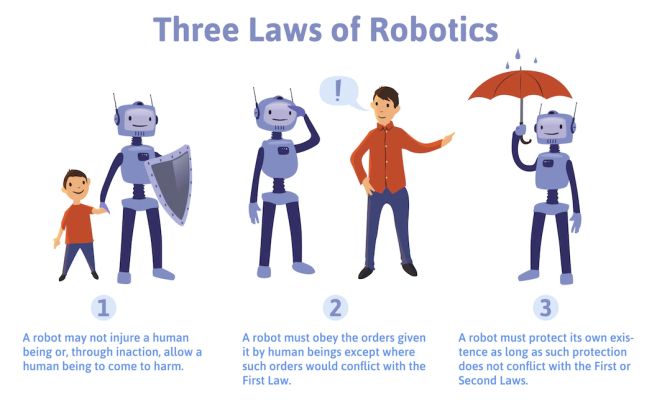 In this story by Isaac Asimov, a scientist tells astounded colleagues a “tall tale” about how a new model robot broke the first and most fundamental of the Three Laws of Robotics: a robot may not injure a human being, or through inaction allow a human being to come to harm. The malfunctioning robot had escaped from its base and, upon encountering the man in a deadly zero-visibility storm, left him to die. Although the robot had a legitimate reason for its actions, the model was discontinued immediately. Themes include disobedience, protectiveness and “motherly” love. More…
In this story by Isaac Asimov, a scientist tells astounded colleagues a “tall tale” about how a new model robot broke the first and most fundamental of the Three Laws of Robotics: a robot may not injure a human being, or through inaction allow a human being to come to harm. The malfunctioning robot had escaped from its base and, upon encountering the man in a deadly zero-visibility storm, left him to die. Although the robot had a legitimate reason for its actions, the model was discontinued immediately. Themes include disobedience, protectiveness and “motherly” love. More…